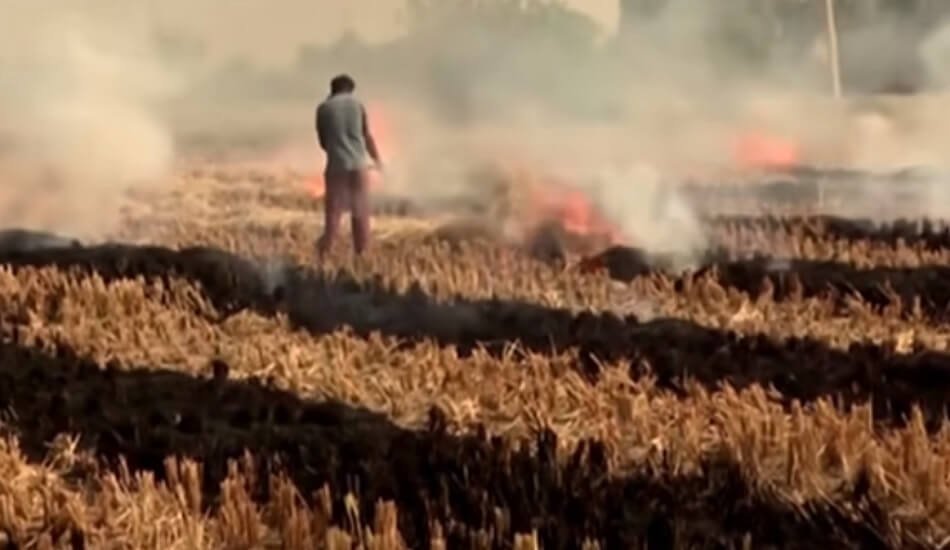Why not use Pusa-Bio Decomposer? experts are divided on cash incentives to farmers.
Experts are divided on the Punjab government’s idea to provide cash incentives to farmers to reduce stubble burning and have questioned why the state has not increased its usage of the Pusa bio-decomposer, which the Delhi government has commended as a cost-effective solution to field fires.
Arvind Kejriwal, the Chief Minister of Delhi, announced last week that the Punjab government has submitted a proposal to the Commission for Air Quality Management to provide cash incentives to farmers in the border state for not burning stubble.
According to the suggestion, Delhi and Punjab should each contribute ₹500, while the Centre should provide ₹1,500.
‘A monetary incentive is a short-term solution to the problem. Other options, such as using paddy straws in boilers and making paper, are expensive. In-situ treatment is the only long-term approach that will also improve soil fertility,’ Dipankar Saha, former head of the Central Pollution Control Board’s air lab, said.
‘In today’s world, waste is considered valuable. We should know how to use it… how to turn it into fertiliser, etc,’ He stated. Also Read | India eliminates stubble burning issue; bio-enzyme breaks straw, converts into fertilizer.
State governments should collaborate with the Indian Agricultural Research Institute since enzyme treatment can degrade paddy straw. They should now look at ways to speed up the enzyme treatment process so that the stubble can be digested in a short period of time, according to Saha.
Paddy straw burning in Punjab and Haryana is a major contributor to the national capital’s worrisome increase in air pollution levels in October and November. Farmers set fire to their fields to burn away crop residue before planting wheat and potatoes.
Farm machinery is offered to farmers at a subsidised rate under a Centre-sponsored scheme for in-situ stubble management. Farmers claim that a financial incentive can assist them in covering the expense of fuel used to operate the machinery. According to environmentalist Bhavreen Kandhari, giveaways would never solve the problem of stubble burning.
‘I don’t believe Punjab has any funds to provide to farmers. They had attempted it before but had failed. The ground reality is much different. The correct course of action is to immediately begin work on a policy. Consider crop diversification,’ She stated.
Kandhari questioned why Punjab and Delhi are not investing in the Pusa bio-decomposer, which the AAP government in the national capital touted as a cost-effective alternative to stubble burning.
If states continue to seek economic incentives to reduce stubble burning, she claims ‘there is nothing substantial in the Pusa bio-decomposer.’
Scientists at the IARI developed the Pusa bio-decomposer in 2020, a microbial solution that can digest stubble and turn it into manure in 15-20 days.
In 2020 and 2021, the Delhi government supplied it free of charge to farmers in the city to control stubble in non-basmati rice fields.
The municipal government had also engaged WAPCOS, a consulting firm affiliated with the Union Ministry of Jal Shakti, to perform an evaluation of the bio-effectiveness. decomposer’s
According to the audit, 90% of the farmers who participated, felt the solution is highly effective. This spurred Chief Minister Arvind Kejriwal to request that the decomposer be distributed free of charge in neighbouring states by the Centre.
Sunil Dahiya, an analyst at the Centre for Research on Energy and Clean Air, believes that there cannot be a single answer to agricultural fires and that states must work on several approaches, including economic incentives.
‘The Pusa bio-decomposer is not a cure for farm fires. Farmers will benefit from financial aid in order to hire labour for stubble control. All other measures, such as farm equipment for in-situ management of paddy straw, the use of stubble in organic agriculture, mulching, and crop diversification, should, however, continue,’ He stated.
When asked if offering economic incentives violates the polluter pays concept, Dahiya stated, ‘You believe farmers are polluters who should be punished. On the other hand, industry and thermal power plants are being given extensions to install emission-reducing equipment. This is not the best approach to run a state.’
According to Vivek Chattopadhya, Principal Programme Manager, Clean Air at the Centre for Science and Environment (CSE), poor farmers who do not have access to subsidised machinery for in-situ management of paddy straw and collection centres for its use in industrial applications should receive financial assistance.
‘However, financial assistance should be provided at the community level rather than to individual farmers,’ he stated. This is not the first time Punjab would offer farmers cash incentives for not burning stubble.
Also Read | India’s first, much-praised wind farm tender awaiting approval from Finance Ministry.
Following the Supreme Court’s advice to incentivize farmers to avert agricultural fires, the governments of Punjab and Haryana offered a bonus of ₹2,500 per acre for small and marginal farmers in 2019.
However, a lack of cash put the programme on hold. The advantage was only available to a few thousand farmers. The Punjab government had even solicited financial aid from the Centre but to no effect.
According to the Indian Agricultural Research Institute, Punjab experienced 71,304 farm fires between September 15 and November 30 of last year, and 83,002 agricultural fires between September 15 and November 30 of this year. Last year, the proportion of farm fires in Delhi’s PM 2.5 (particulate matter) pollution reached 48% on November 7.


















Add Comment